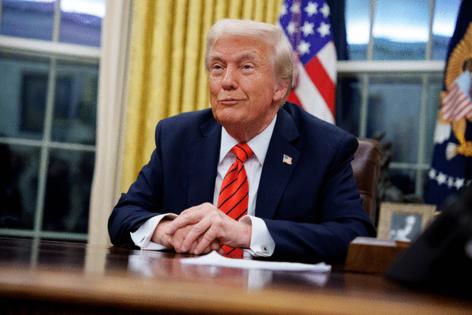Democrats sue Trump over his sweeping 'election integrity' order
Published in News & Features
President Donald Trump’s sweeping executive order directing major changes to the way America registers voters and counts mail-in ballots was challenged as unconstitutional in separate lawsuits filed by the Democratic National Committee and a group of nonprofits.
Trump’s directive, which for the first time would require proof of citizenship to register to vote and ban the counting of lawful mail-in ballot that arrive after Election Day, threatens to disenfranchise voters and upend an election system that has “stood the test of time,” the DNC said in its complaint.
The suit was filed in Washington federal court by Democrats including Senate Minority Leader Chuck Schumer, House Minority Hakeem Jeffries and other groups, escalating a growing battle between the party and the 78-year-old Republican president over his efforts to expand his power over the U.S. government.
“The Framers of our federal Constitution foresaw that self-interested and self-aggrandizing leaders might seek to corrupt our democratic system of government to expand and preserve their own power,” the Democrats said. “They therefore created a decentralized system of elections based upon separated powers divided among the leaders elected by — and closest to — the people.”
Trump has argued that the unprecedented changes, which could have a big impact on the next election, are necessary to prevent the kind of voter fraud that he falsely blames for his 2020 loss to Joe Biden.
A spokesperson for the White House didn’t immediately respond to a request for comment.
Earlier on Monday, a similar lawsuit was filed by nonprofits representing Latinos, military families and college students.
“Under our Constitution, the President does not dictate election rules,” the groups said in their complaint. “States and Congress do.”
Schumer and Jeffries said they sued because the changes called for under Trump’s executive order could impact their bids for reelection.
“These injuries are not mere idle concerns for a future day,” they said in their complaint. “They come on the cusp of at least three special congressional elections and two gubernatorial elections in the coming months.” And they said the campaign cycle for the 2026 midterm elections “is already well underway.”
Several Democratic state attorneys general said last week that they’re exploring legal options to challenge the executive order, citing evidence from Democrat and Republican-led states that U.S. elections are already secure and that voting by noncitizens is exceedingly rare.
Legal challenges
The new lawsuits on Monday are among more than 175 challenging Trump’s directives, many of which seek to stretch the limits of presidential power. The U.S. Supreme Court is likely to have the final say in many of the cases, particularly around immigration and efforts to shrink the federal workforce.
The first suit over Trump’s order was filed by the League of United Latin American Citizens, or LULAC, which represents hundreds of thousands of members in dozens of states. The other groups in that case are the Secure Families Initiative and the Arizona Students’ Association, both of which describe themselves as nonpartisan organizations representing thousands of voters.
The nonprofits said Trump is trampling on the authority of states to run elections by demanding proof of citizenship. They also claim the president can’t restrict the counting of mail-in ballots that are postmarked by Election Day, even if they arrive days later — a practice allowed by more than a dozen states.
“The order is an attack on the constitutionally mandated checks and balances that keep American elections free and fair,” the suit says. “Through this unconstitutional action, the president intrudes on the states’ and Congress’s authority to set election rules in an attempt to make it far more difficult for eligible US citizens to exercise their fundamental right to vote.”
Passports, real ID
The executive order requires the Election Assistance Commission to amend its national mail voter registration form to require proof of citizenship for the first time, including a U.S. passport and other IDs compliant with the Real ID Act of 2005.
According to the suit, only about half of all Americans have U.S. passports, while most Real ID compliant identification documents “do not indicate that the holder is a citizen of the United States.” The plaintiffs say that only “enhanced” versions of the ID indicate citizenship, and they’re only used in five states.
The groups are also challenging a provision of the executive order that threatens to withhold federal financial assistance for administering elections from states that fail to follow Trump’s order.
The president also directed the U.S. Attorney General to take “all necessary action” against states that count mail-in ballots that were lawfully cast by Election Day be received later. According to the suit, neither the president nor the attorney general has such authority.
“The U.S. Supreme Court has said that while votes must be cast by Election Day, some aspects of the election process, such as tabulating all votes, will naturally take place after Election Day,” the groups said. “Congress has also recognized the difference between ‘collecting’ absentee ballots and ‘delivering’ them to election officials for tabulation.”
The cases are Democratic National Committee v. Trump, 25-cv-952, U.S. District Court, District of Columbia (Washington); League of United Latin American Citizens v. Executive Office of the President, 25-cv-946, U.S. District Court, District of Columbia (Washington).
_____
©2025 Bloomberg L.P. Visit bloomberg.com. Distributed by Tribune Content Agency, LLC.







Comments